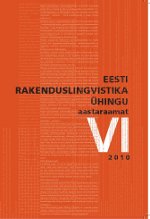Eesti keele ajakategooria omandamisest – ajavormid ja ajasõnad
The acquisition of tense and time adverbs in Estonian
Author(s): Sirli Parm, Reili ArgusSubject(s): Language and Literature Studies
Published by: Eesti Rakenduslingvistika Ühing (ERÜ)
Keywords: language acquisition; tense; temporal words; Estonian
Summary/Abstract: The article discusses the acquisition of the category of time by 135 normally developed Estonian children between 4 and 7 years of age. The discussion is based on a psycholinguistic experiment that focused on tense forms and time adverbs. The experiment consisted of three tests designed to show at what age Estonian children develop a clear distinction between the past and non-past, whether the use of time adverbs helps the children to understand the grammatical tense used, and which time adverbs the children find easier to understand. The results of the experiment show that of the means of grammatical tense marking, the present tense forms are already understood by the four-year-olds while the past and future forms only by the six-year-olds. The situationally correct use of the present and the past tense forms is only acquired at the age of six and that of the future tense forms even later.
Journal: Eesti Rakenduslingvistika Ühingu aastaraamat
- Issue Year: 2010
- Issue No: 6
- Page Range: 025-041
- Page Count: 16
- Language: Estonian

